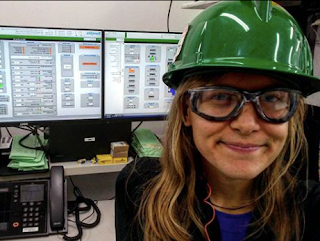There is a lot of craze and excitement about 'green' and clean energy. From electric cars to solar panels, from wind turbine farms to hydro power plants, it is clear renewable energy is becoming an international priority. While I absolutely support the movement I'm happy to state the facts, solar, wind and hydro are not enough!! If the world wants to produce an amount of power that can compete with coal and gas, while being sustainable, safe, and clean, we must get nuclear.
Fission and fusion are both very exciting and interesting fields of new discovery and cutting edge technology. Recently I have been extremely intrigued by the concept and design of the fourth generation nuclear reactors. China is the first in the world to demonstrate a power production project of 200,000 kilowatts and it is happening with the new reactor! This is super exciting and cool! We are finally talking about a real number that can influence the fossil fuel industry and create a better world for the future generations. Especially if we are serious about the human race goals of deep space exploration and traveling at the speed of light.
 As seen in the article, Nuclear Experts Head to China to Test Experimental Reactors by Stephen Stapczynski, "Some Generation IV designs aim to cut construction costs by using coolants that work at atmospheric pressure -- reducing the need for massive containment structures. Many recycle their fuel, reducing the need for uranium, and in some cases are fail-safe without intervention if something goes wrong. In a pebble-bed reactor, for example, thousands of tiny fuel seeds encased in tennis-ball sized graphite "pebbles" can withstand much higher heat. In the event of an accident or loss of coolant, the rising temperature automatically shuts down the nuclear reaction."
As seen in the article, Nuclear Experts Head to China to Test Experimental Reactors by Stephen Stapczynski, "Some Generation IV designs aim to cut construction costs by using coolants that work at atmospheric pressure -- reducing the need for massive containment structures. Many recycle their fuel, reducing the need for uranium, and in some cases are fail-safe without intervention if something goes wrong. In a pebble-bed reactor, for example, thousands of tiny fuel seeds encased in tennis-ball sized graphite "pebbles" can withstand much higher heat. In the event of an accident or loss of coolant, the rising temperature automatically shuts down the nuclear reaction."
Recycling war heads, automatic self shut downs, these fourth generation rectors are so next level! I'm so excited and motivated to work really hard in school, so I can hopefully, one day, have the honor of working hand-in-hand with nuclear operators and engineers that see the potential behind this new engineering design.
Get nuclear!
-Abra
For more information see:
- http://english.gov.cn/news/video/2017/02/14/content_281475567202088.htm
- https://www.bloomberg.com/news/articles/2017-09-21/nuclear-scientists-head-to-china-to-test-experimental-reactors
- https://www.nextbigfuture.com/2017/03/china-will-complete-five-nuclear.html
